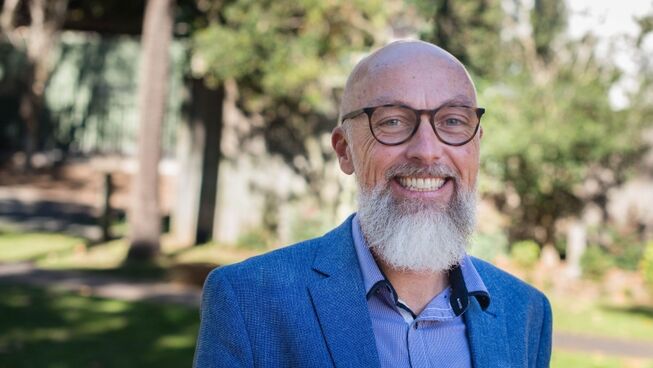
Is religion really in decline across the world? Are people really giving up on God? And if it is the case, is that a good thing for society? In an article called Giving up On God: The Global Decline of Religion, in the latest edition of Foreign Affairs magazine, Ronald Inglehart answers all three of those questions in the affirmative.
Inglehart is the Amy and Alan Lowenstein Professor Emeritus of Democracy, Democratization, and Human Rights at the University of Michigan, so he’s got a vested interest in investigating what will lead to the furthering of those three lofty ideals. And religion - or at least its decline - is something he links to the advancement of these causes.
Inglehart makes this observation about the studies he has done into the decline of religion across the globe:
Several forces are driving this trend, but the most powerful one is the waning hold of a set of beliefs closely linked to the imperative of maintaining high birthrates. Modern societies have become less religious in part because they no longer need to uphold the kinds of gender and sexual norms that the major world religions have instilled for centuries.
So to begin with, he’s got a fairly narrow definition of what counts for advancement, and it’s centred around, though not exclusive to, sex and gender. And he’s confidently assuming a trajectory of societal health that is all of two minutes old, compared with centuries of sexual and gender norms. That’s a leap of faith right there.
Inglehart especially notes the decline of religion in The United States, which was just one of the 43 out of 49 countries studied, that have seen religion decline with what he says is “surprising speed” since 2007.
While pointing out that as societies increase in wealth and security they become less religious, and noting that this happens across the whole world and not just in the West, he singles out his home country for special note. And yes, it is true, it would appear that religious observance is on the decline in The United States:
Near the end of the initial period studied, Americans’ mean rating of the importance of God in their lives was 8.2 on a ten-point scale. In the most recent U.S. survey, from 2017, the figure had dropped to 4.6, an astonishingly sharp decline. For years, the United States had been the key case demonstrating that economic modernization need not produce secularization. By this measure, the United States now ranks as the 11th least religious country for which we have data.
Inglehart makes much too - and sadly is often on the money - of the US’s political polarisation, the political ties with religion, and the trend away from religion among younger more liberal types, as proof that belief is on the wane. And as noted before, he makes much of the falling birth rates in developing countries, which he claims leads to an emancipation in terms of sexuality and gender, and loosens taboos on sexual practices that were previously frowned upon.
All in all, Inglehart sees nothing but positives coming from this decline. And the conclusions of his studies bears out his optimism, with the more religious countries being among the poorest, with the most corruption, the highest murder rates; while being the most punitive towards crimes, but with no corresponding fall in rate of crime etc.
Of course he is at great pains to say that religion does not cause such crimes to be committed, but the higher rate of religion in countries studied correlates to higher levels of crime. He’s being disingenuous. “You do the math”, he’s saying, “I couldn’t possibly draw such a conclusion!”
He concludes by saying that although COVID-19 has put a dent in religious decline, with evidence that people are praying more in these difficult times, that’s just a short term thing, so don’t read religious revival into it:
… that shift remains unlikely, because it would run counter to the powerful, long-term, technology-driven trend of growing prosperity and increased life expectancy that is helping push people away from religion. If that trend continues, the influence that traditional religious authorities wield over public morality will keep shrinking as a culture of growing tolerance becomes ever stronger.
In other words, despite being at pains to decouple the presence of religion with the yucky stuff that’s happening in religious countries such as high murder rates and corruption, Inglehart clearly links “growing tolerance” with religious decline, and the lack of influence of the moral gatekeepers.
To which we would have to say, Really? If The United States is experiencing such a rapid decline in religion - and I would say that it is actually secularisation clearing out the long-term nominalism in that country - then why such a rapid, toxic political polarisation in that country?
There is little evidence that people in The United States are more tolerant of those they disagree with. In fact just the opposite is the case. Intolerance and a deep chasm between opinions has fuelled a hostile public square. The moral gatekeepers in that country do not seem particularly tolerant of their opponents, whether of the Left or the Right. Political tribalism is threatening the social fabric of many post-religious countries.
And Inglehart fails to account for the fact that the latest religious decline in his home country follows an anomalous period of religious fervour, one that was not at all evident in the 1800s when church attendance was far lower than it was in the mid-1950s, while the birth rate was much higher two centuries ago than it was half a century ago.
He also fails to account for the fact that the industrialisation and modernisation of the West, and its subsequent religious shrinkage, has taken a heavy toll on the more religious countries, who have been at the mercy of the least religious countries in terms of economics and justice.
It is precisely the more religious people of the Third World who have worked the sweat shops of the major multi-nationals - all progressive and secular (post-Christian especially) -, and who have made billions at the expense of the world’s religious poor. Huge levels of inequality have been experienced as poor religious folk become caught in the cogs of the almighty corporations birthed in and fuelled by a consumption culture that borders on a religion itself.
And if corruption does occur in their countries, it’s not coming from the masses - it’s being driven by the unelected elites who manage to spend plenty of time crossing the globe to hang out with their secular Western counterparts. That’s why so much aid money disappears before it gets to the religiously observant poor who need it most.
And of course, this fails to account for China, the country set to take over The United States as the primary global superpower, which has managed to correlate deep, and secular, injustice and lack of tolerance towards anything except State power, with a rapid jump in technological and industrial power not seen since the post war US.
Sure, China may indeed become less religious, but it appears to be doing so in increasingly less tolerant, heavy-handed ways. And, conversely, I wonder what he would say about South Korea’s rapid industrialisation and technological leap forward, that has gone hand in hand with the rise of “hot religion”. There’s not a lot of nuance in the article, and there’s a clear agenda to it as well.
But also consider this, a declining birth rate, seen by Inglehart as the saviour of a nation, since it is linked to tolerance and sexual liberties, is fast becoming the death knell of many a secular country, one which is ringing out too late.
Countries with declining birth rates feel the sugar buzz for a generation or two, then fall into a panic as they age, their taxation base shrinks, and they find they have to import poorer, more often religious, people from other countries to do the work their absent children once would have done. That’s a clear trend across the West, and in the technologically advanced Asian cultures.
Inglehart puts much on the declining birthrate, as if it somehow is the saviour of the secular tolerance agenda. But countries such as the Scandinavian ones, which are his poster boys of secular success, are also the most atomised countries, heavily dependent on a welfare state that will only be sustainable long term if the birth rate rises! In fact, across that Northern European region fifty percent of households are one-person households.
Clearly he’s not seeing the bigger picture, or seeing history across a long enough time span. There has often been religious decline in countries prior to technological advance. England in the 1700s was at times deeply irreligious in terms of actual church attendance, and those periods corresponded with enormous inequality and the rise of the slave trade. Secularisation theories make a lot of sense if you look at the last fifty or sixty years (and within a narrow band of countries), and not a lot of sense if you look at the last five hundred years across the world.
Is religion in decline? Perhaps. It has been before. Will people really give up on God? This also could be the case. Is this a permanent trend thanks to wealth and security? Well if wealth and security were as permanent as Inglehart faithfully believes they are, then maybe. Indeed Jesus and the apostles make that claim too!
But if history has taught us anything - and never quite so painfully - it is that those who take such inevitable progress for granted often find themselves sitting in the ashes of their convictions after the fires of reality have swept through and burned them to the ground. And the Bible has much to say about that also. And, ironicallly, it’s at those points in life that the Bible story makes the startling claim that people turn to God once more. Don’t bet on that not happening again.


